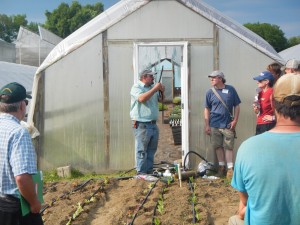
Trevor Hardy, irrigation supplier and farmer, discusses drip irrigation systems at UVM Extension workshop
To continue investigating a climate change survey of farmers at the Intervale, Maggie Donin from the Intervale Center highlights the production changes which farmers have reported they’ve made in response to extreme weather and climate change. These include planting and tillage practices as well as some infrastructure improvements and site location decisions.
Production adaptations reported by farmers:
- Soils and Tillage practices
- Increase soil organic matter
- Change tillage practices to quicken recovery
- Use raised beds in field production
- Put higher field margins into production
- Ensure shared equipment is washed off after use to reduce spread of pests and disease in soils
- Planting changes
- Plant highest fields first to reduce risk from spring flooding
- Plant fast growing crops in riskiest fields to ensure quick turnaround if lost to flooding
- Plant items with lowest inputs in risky fields (ex: lettuce, sweet corn, grains, winter squash). Inputs include seeds, labor, fertilizer
- Plant a diversity of crops
- Plant more perennials over annuals
- Plant higher fields more densely
- Plant buffer rows of willows which can survive flooding and minimize the speed of flood waters
- Extend the growing season on both ends
- Infrastructure Improvements
- Build greenhouses or high tunnels for controlled environments
- Purchase an irrigation system
- Build a well to mitigate drought risk
So far, the most successful strategies have been growing on less flood prone land, building high tunnels and greenhouses, and having a diversity of markets and production so that one event doesn’t affect everything on your farm.
Overall, this survey demonstrated that farmers clearly understand that there are many risks facing their farms each season, not just extreme weather. The Intervale farmers have decided that the benefits outweigh the risks. Regardless of their location, weather related challenges will always pose risks for farming. These farmers have found that many of the strategies to mitigate risks and increase resiliency to extreme weather align with their practices for sustainable and organic agriculture. These practices and techniques include managing healthy soils, diversifying crops for different markets, and building human and social capital, all of which are the basis for sustainable farm businesses. While extreme and erratic weather and inexorable climate change will never be in farmers’ complete control, the Intervale farmers in Burlington, Vermont are relying on core concepts of sustainable agriculture to deal with an uncertain future.
As a last resort, some farms also consider and potentially make the decision to find new land and move their production to higher ground. Delving into when and how some farmers decide to make this big move will be covered in a future blog piece.
« Findings from Farmer Climate Change Survey – Business Adaptations Adapting to heavy rain at LePage Farm »
